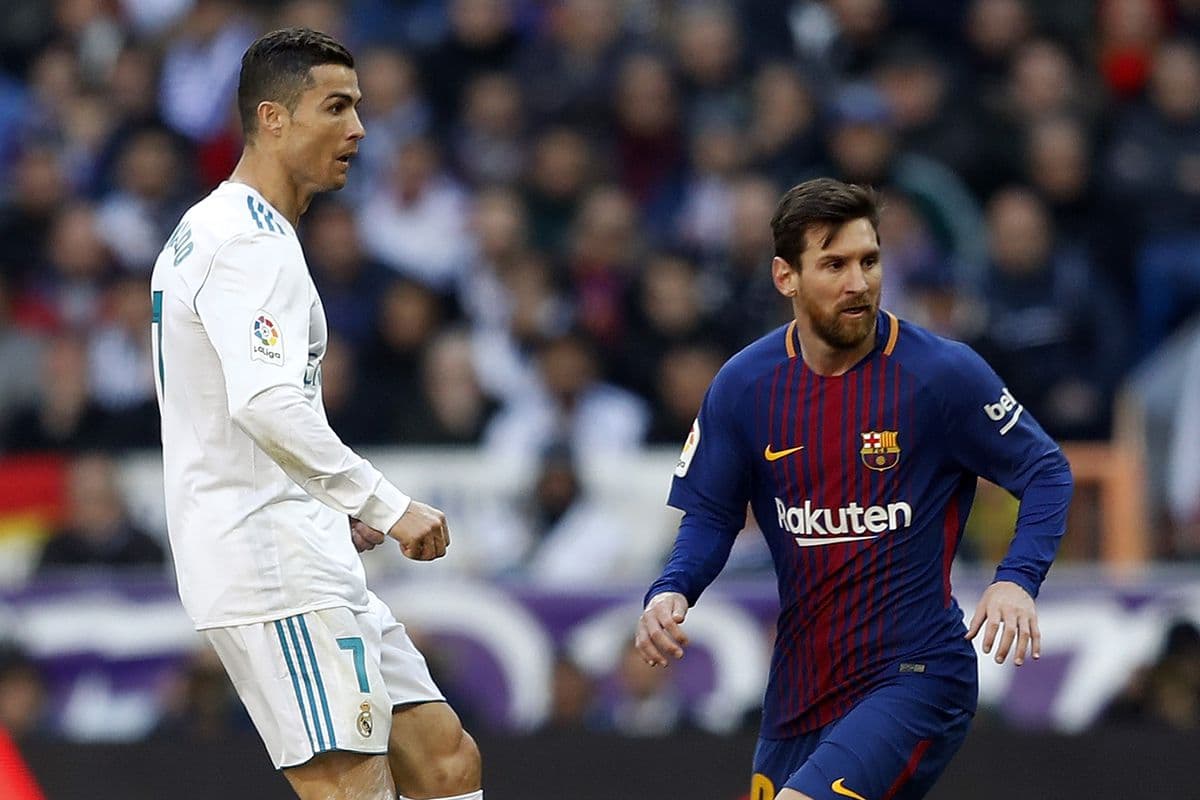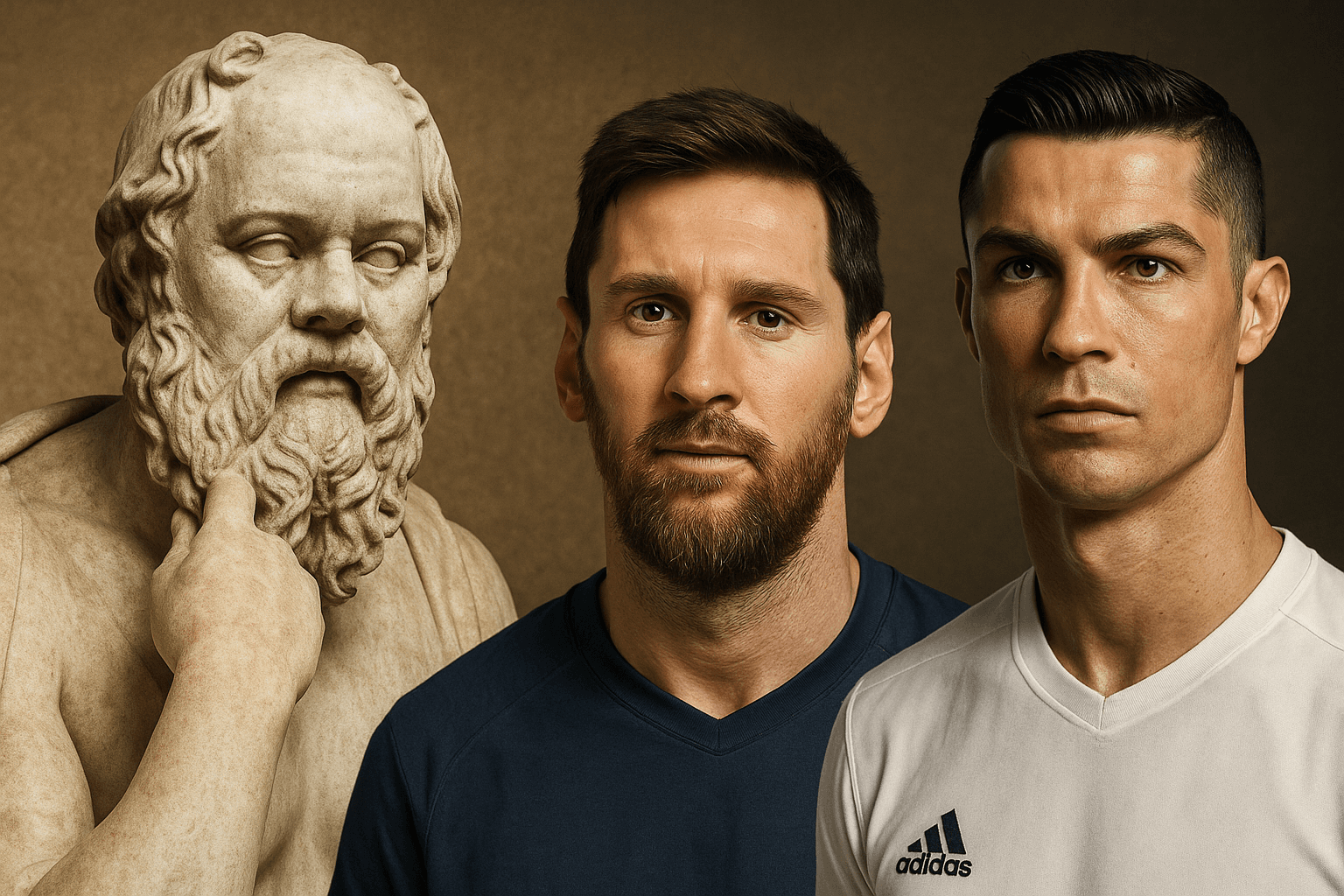
I’ve been reading Plato’s “The Republic”, and it was my first introduction to the Socratic method of debate where Socrates questions his opponents to expose contradictions, leading them to a conclusion that he favours. Usually these questions and topics are of deep philosophical nature, but I was wondering how it would apply to one of the biggest debates in our generation - who is the greatest footballer of all time? Cristiano Ronaldo or Lionel Messi? With the help of good old chatGPT, I thought it would be great to write a socratic dialogue on this topic. First, let’s explore why Ronaldo is the greatest, and then why Messi is. I’ll drop my verdict at the end :)

Socrates: Tell me, dear friend, what is it that makes a footballer truly great? Is it the manner of his play, the number of his victories, or the breadth of his excellence?
Meeren: I would say it is a combination of all those things, Socrates.
Socrates: You speak wisely. And if one player shines more brightly in one area, and another in another, must we not weigh them carefully to judge?
Meeren: Certainly.
Socrates: Now, would you agree that Lionel Messi plays with an unmatched natural grace?
Meeren: Without question.
Socrates: And do you believe Cristiano Ronaldo possesses such effortless grace?
Meeren: No, not in the same way.
Socrates: Then let us say Messi is superior in natural artistry. Do you agree?
Meeren: Gladly.
Socrates: Yet is artistry the whole of greatness? Or is greatness something broader?
Meeren: It must be broader.
Socrates: Good. Now tell me, is a player greater who masters only one arena, or one who masters many?
Meeren: Surely one who masters many.
Socrates: And has Messi proven himself in many leagues?
Meeren: He proved everything at Barcelona — the greatest club team of its time.
Socrates: And rightly so. But has he conquered England? Italy? Different systems, different defenses?
Meeren: No... but he didn’t need to! He showed his greatness without moving.
Socrates: Perhaps. Yet is greatness shown only by staying, or also by venturing into the unknown and triumphing there?
Meeren: It is greater to triumph in many places... but Messi made Barcelona the greatest place.
Socrates: True — yet Barcelona had great players around him too, did it not?
Meeren: Yes, players like Xavi and Iniesta.
Socrates: And would you say it is easier to shine in a team of such magicians, or harder?
Meeren: Perhaps easier, though Messi was the best of them.
Socrates: No one doubts it. Yet Ronaldo succeeded in Manchester United, Real Madrid, Juventus — among different teammates, under different coaches, with different demands.
Is this not a harder road?
Meeren: Harder, yes, but Messi’s loyalty shows character too.
Socrates: Loyalty is a virtue, assuredly. But is loyalty itself a proof of footballing greatness, or of personal character?
Meeren: Of character, I suppose.
Socrates: Then we must still look to footballing achievements to judge greatness?
Meeren: It seems so.
Socrates: Let us continue: who has scored more official goals?
Meeren: Ronaldo.
Socrates: And who has remained at the top level longer, still scoring into his late thirties?
Meeren: Ronaldo again.
Socrates: And who has won major trophies in England, Spain, and Italy?
Meeren: Ronaldo.
Socrates: Who lifted an international trophy first for his country?
Meeren: Ronaldo won the Euros before Messi won the Copa America.
Socrates: And while Messi now has his World Cup — a crowning glory — would you agree that Ronaldo carried a less talented national team to a major title?
Meeren: That is true, Socrates.
Socrates: Then if one player shows more artistry, but the other shows more achievement across different lands, greater longevity, and triumphs with less support, which is greater in total measure?
Meeren (hesitating): I still think Messi is more beautiful to watch.
Socrates: No one disputes that. I love the sight of Messi weaving through defenders as I love the sight of a master painter at work.
But if we speak not of beauty alone, but of full greatness — tested across battles and years and borders — must we not give the crown elsewhere?
Meeren (slowly): It seems we must.
Socrates: Then whom does true footballing greatness crown?
Meeren (after a long pause): Cristiano Ronaldo.
Socrates: And you say this not because I forced you, but because reason and truth compelled you?
Meeren: Yes, Socrates.
Socrates: Then rejoice, my friend: you have judged not by affection, but by wisdom.
(A silence fell among them, and after a moment, Socrates spoke one final truth, as if carving it into the air:)
Beauty delights the eye, but greatness conquers time.
Messi danced through defences; Ronaldo conquered empires.
One played the perfect game; the other became its ruler.
Socrates: Tell me, friend, what do you believe is the highest form of greatness in football — is it victory alone, or something more?
Meeren: I think victory matters most, Socrates. Winning is everything.
Socrates: Indeed, winning is sweet. But tell me, does a man who wins by brute strength alone deserve more honour than one who wins with beauty, with grace, with the touch of the divine?
Meeren: Perhaps beauty adds to greatness, but without victory, it means little.
Socrates: True, we do not honour the dancer who stumbles, however beautiful his form. But if a player wins and plays beautifully, is that not the highest summit?
Meeren: It must be, yes.
Socrates: Then let us ask: which player, between Messi and Ronaldo, combines beauty and victory most perfectly?
Meeren: Well... Ronaldo has won in many leagues, Socrates. He has proven himself everywhere.
Socrates: And this is a mark of endurance, no doubt.
But tell me — is it greater to conquer many average kingdoms, or to rule a single, shining empire for an age?
Meeren: I am not sure what you mean.
Socrates: Was Barcelona under Messi an ordinary team?
Meeren: No — it was one of the greatest teams ever.
Socrates: And who was at the heart of that empire? Who shaped its victories, its beauty, its soul?
Meeren: Messi, of course.
Socrates: Then is it not true that while Ronaldo journeyed across many kingdoms, Messi built a dynasty unmatched in the game's history?
Meeren: That sounds fair, but Ronaldo tested himself more widely.
Socrates: He did, and for that he deserves honour.
Yet tell me, friend: is greatness measured only by the number of places one conquers, or by the depth and quality of the kingdom one builds?
Meeren: I suppose depth matters too.
Socrates: Good. Now, who has more assists, creating goals for others, lifting the whole team?
Meeren: Messi has more assists.
Socrates: And is creating joy for others not a greater act than glorying only in oneself?
Meeren: It is more generous, yes.
Socrates: And who has maintained the highest creative influence — not only scoring, but orchestrating — across his career?
Meeren: Messi, clearly.
Socrates: Then if we prize beauty, selflessness, and orchestration of the game as well as victory, which player shows the fuller greatness?
Meeren: It would seem Messi does.
Socrates: Let us go further: who stands as the greatest passer, the most visionary playmaker, the most natural artist with the ball?
Meeren: Messi.
Socrates: And who, even now, continues to delight crowds not merely by numbers, but by moments that seem touched by something beyond human skill?
Meeren: Messi again.
Socrates: And tell me, has he now also conquered international football, lifting the Copa America and the World Cup?
Meeren: Yes, he has.
Socrates: So he has beauty, loyalty, creativity, longevity, and now international triumph.
Is anything lacking?
Meeren (hesitating): No... but Ronaldo is such a machine, such a symbol of hard work.
Socrates: True — and effort is a noble thing.
But tell me, friend: is it greater to climb by endless labour, or to be touched by natural genius and still conquer?
Meeren: Genius, I suppose, is rarer.
Socrates: And which man made the game seem more effortless, more divine, more like art than toil?
Meeren: Messi.
Socrates: Then if Ronaldo is the great soldier of football, Messi is its poet-king.
And if greatness includes beauty, loyalty, inspiration, creativity, team play, titles, and the final crowning of the World Cup, who must we call the greatest?
Meeren (slowly, almost reluctantly): Messi.
Socrates: And you say this not from passion, but from reason?
Meeren: Yes, Socrates.
Socrates: Then rejoice, my friend. For in loving Messi, you have loved not only victory, but beauty itself.
(A silence fell among them, and after a moment, Socrates spoke one final truth, as if carving it into the air:)
Effort wins battles, but genius shapes history.
Ronaldo stormed the gates; Messi rewrote the game.
One conquered the world; the other made a world worth conquering.
Who cares. They're both Gods. End of. I'm a Cristiano fan though - more because of his character rather than footballing ability. Anyway, which Socratic Duel do you think is more convincing?


